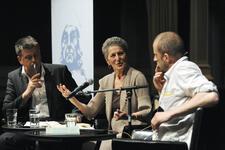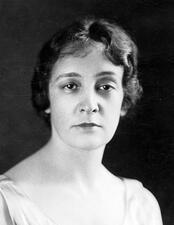
Ray Karchmer Daily
Ophthalmologist Ray Karchmer Daily fought for equality and accessibility for women and children in Texas. The first Jewish woman to graduate from a Texas medical school, Daily advocated for equal treatment of female medical students and promoted equitable policies for low-income and disabled students in the Texas school system.

Helen Miller Dalsheimer
Helen Miller Dalsheimer was a leader in the Jewish community, both nationally and in her native Baltimore. She had a distinguished career as a volunteer, helping lead organizations such as the National Federation of Temple Sisterhoods and the Women’s Hospital of Baltimore.
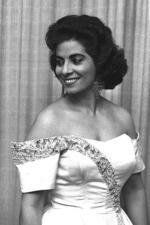
Shoshana Damari
Shoshana Damari’s lush voice and her fusion of Eastern and Western musical aesthetics made her the voice of a generation in Israeli music, recording dozens of albums in her career. She made several movies, was known for her song “Kalaniyot” (Poppies), and was awarded the Israel Prize in 1988 for her contributions to Israeli music and culture.

Dance in Mexico
Jewish women in Mexico have undertaken numerous activities in dance. They have made inroads in amateur and professional spaces within and outside their community and made contributions to the performance, creation, education, promotion, and research of several forms of dance and body techniques, all of which often involved breaking through barriers imposed by their communities.

Dance in the Yishuv and Israel
Artists began to try to create a new Hebrew dance in the 1920s. Israeli Expressionist Dance flourished first, followed by American modern dance. Israeli dance became professionalized and centralized, and over the past few decades, efforts to promote local creativity accelerated, ethnic dance companies have flourished, and choreographers have taken increasingly political stances.
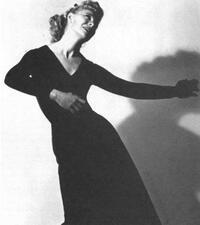
Modern Dance Performance in the United States
Jewish immigrants to the New World brought with them their ritual and celebratory Jewish dances, but these traditional forms of Jewish dance waned in the United States. Working-class and poor Jewish immigrants parents sought out culture and education in the arts for their children, often as a vehicle for assimilation. Jewish women were particularly attracted to the field of modern dance.
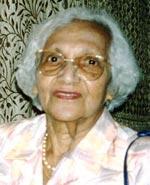
Ruby Daniel
Ruby Daniel’s 1995 book, Ruby of Cochin: An Indian Jewish Woman Remembers, combines recounting of historical events with engaging storytelling. The book endures as a significant contribution to Jewish history and ethnography.
Ruth Dar

Rabbi Michelle Dardashti
Rabbi Michelle Dardashti currently serves as the Rabbi of Brown RISD Hillel and Associate University Chaplain for the Jewish Community at Brown.

Lili Darvas
Lili Darvas was an internationally acclaimed actress, known on the stage and screen in Europe and the United States. Born in Budapest in 1902, as an actress Darvas combined the fetching qualities of an ingenue with the depth and mature allure of an experienced woman of the world, which led to her rise to fame in New York, Germany, and Hungary.

Daughter of Jephthah: Bible
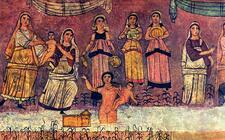
Daughter of Pharaoh: Midrash and Aggadah
The rabbis depict the daughter of Pharaoh, who rescued the baby Moses, as a righteous figure who did not follow her father’s wicked ways but rather converted and ceased worshiping idols. She was highly praised by the Rabbis, and the midrash includes her among the devout women converts and those who entered the Garden of Eden while still alive.

Daughter Zion (Bat Tzion)
“Daughter Zion” or “Fair Zion” (in Hebrew bat tzion) is the personification of Jerusalem in poetic and prophetic literature. Initially, the city is positively likened to a daughter, protected under God’s special regard, but later, under the Babylonian siege, she is devastated, even ravaged. However, when Jerusalem is rebuilt, the daughter is forsaken no longer, returning to God’s grace in the prophecies of consolation.
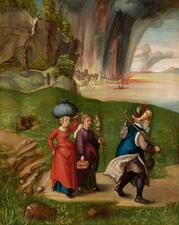
Daughters of Lot: Bible
When the men of Sodom demand sexual relations with two messengers from God, Lot offers his daughters instead. The daughters, however, escape with Lot and live in a cave after Sodom is destroyed. There they have relations with their father and give birth to his sons.

Daughters of Zelophehad: Bible
The story of the five daughters of Zelophehad provides legitimation of a limited right of Israelite women to inherit land. The story celebrates women’s boldness and at the same time offers comfort for men who have the misfortune (from the Bible’s androcentric point of view) to have no sons.

Daughters of Zelophehad: Midrash and Aggadah
The midrash rains many praises on the daughters of Zelophehad, describing them all as equally wise and virtuous, as well as exegetes. The midrash also says that they are mentioned by the Patriarchs and are so righteous that they are blessed with children despite their old age.
Annette Daum
A deeply religious feminist, Annette Daum dedicated her life to two causes: interfaith dialogue and feminism. Among other leadership positions, she coordinated interreligious affairs at the Union of American Hebrew congregations, edited the journal Interreligious Currents, and organized various task forces focused on gender equality and Jewish-Christian feminist dialogue.
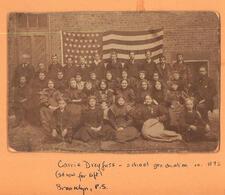
Carrie Dreyfuss Davidson
Carrie Dreyfuss Davidson became an important voice for women in the Conservative Movement as a founder of United Synagogue’s Women’s League and founding editor of its journal Outlook. Davidson exemplified the often-competing paradigms of Jewish homemaker and accomplished writer and community leader.

Rita Charmatz Davidson

Erika Davis
Born, raised, and educated in Toledo, Ohio, Erika Davis is an independent birth and postpartum doula, childbirth educator, and yoga instructor.

Susan Davis
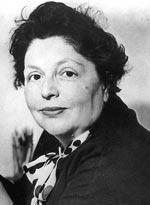
Lucy S. Dawidowicz
Lucy S. Dawidowicz was an American-Jewish historian whose influential and controversial works reflect her deep personal and academic commitment to the Jewish people. She spent time in Poland immediately before the Holocaust and time in Germany immediately after it. Dawidowicz’s works, which received numerous awards, concern American and Eastern European Jewry, and the Holocaust.
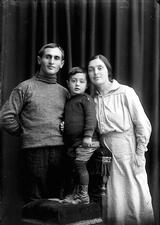
Devorah Dayan
Devorah Dayan was a symbol of the new Hebrew woman in pre-state Israel: she was maternal, rooted in the land, and fulfilled the values of a pioneer society. Her long writing career mostly comprised of autobiographical essays in publications for the women workers’ movement.

